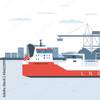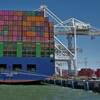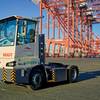Stevens Receives Port Grant to Bolster Coastal Resiliency
$6.6 Million Grant Will Support Center for Coastal Resilience and Urban Xcellence (CRUX) Research
Stevens Institute of Technology has received a five-year, $6.6 million research grant from the Port Authority of New York/New Jersey (PANYNJ) to improve preparedness and resiliency at critical Port Authority infrastructure sites through an innovative observation and forecast system that provides information on the potential risk and magnitude of overland flooding prior to and during significant storm events.
"We have envisioned a road map to more accurate flood forecasting by creating an ensemble of forecasts that, when brought together, should provide unprecedented levels of accuracy and uncertainty quantification," explained Stevens Professor Alan Blumberg, director of the University's Davidson Laboratory and principal investigator for the research . Key researchers with Blumberg are Professors Nickitas Georgas and Thomas Herrington. The resulting integrated flood observation and forecast system will extend the NY/NJ Harbor (NYHOPS) coastal monitoring system and Stevens Storm Surge Warning System, both previously developed by Stevens to better equip New York and New Jersey to forecast and prepare for storm impacts.
The research grant includes the purchase of a Hewlett-Packard scalable supercomputer that is being named Pharos - the Greek word for lighthouse. Pharos will reside in the new Stevens “Hyperscale Supercomputer Center,” presently under construction. The grant will also support purchase and installation of 26 new sensors to be deployed in New York Harbor to measure water levels, temperature and salinity every six minutes and transmit that data in real time to the Stevens supercomputer.
Communication of forecasts to the public is a key aspect of the research. The new system will create dynamic, web-based informational materials that relate real-time and forecasted flood levels to local flood benchmarks.
"The forecasts must be communicated to the public in a way that they are easily understood. Decisions whether to shelter in place or evacuate, or even where to move your car, should be made with confidence and we are hoping that this system once fully deployed, will provide that confidence" said Blumberg.
“The new science coming out of this program will greatly benefit the research community, as well,” added Georgas.
“This contract represents a very meaningful partnership between the Port Authority and Stevens, a partnership built upon years of close collaboration in technology development to ensure navigation safety, maritime security and environmental stewardship,” said Michael Bruno, Feiler Chair Professor and Dean of Stevens' Schaefer School of Engineering and Science. “We are looking forward to the opportunity to develop and apply the leading-edge tools needed to assist the Port Authority in the protection of their critical infrastructure.”
The research will be conducted within the Stevens’ newly-formed Center for Coastal Resilience and Urban Xcellence (CRUX). As rising sea levels and storm intensity threaten coastal cities worldwide, CRUX works to bolster urban resilience to extreme events while simultaneously improving quality of life. CRUX Director Alex Washburn will work with Blumberg and his colleagues to better understand the interaction of the urban region with the environment and populations and create better interventions that reduce environmental threats.













